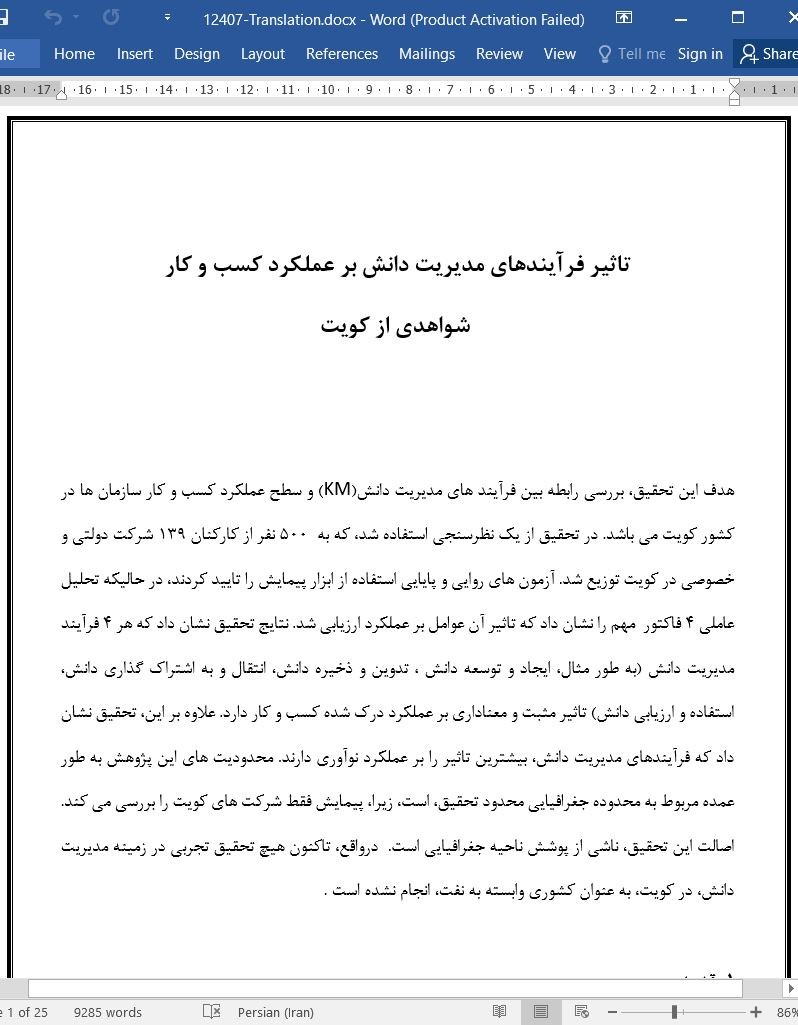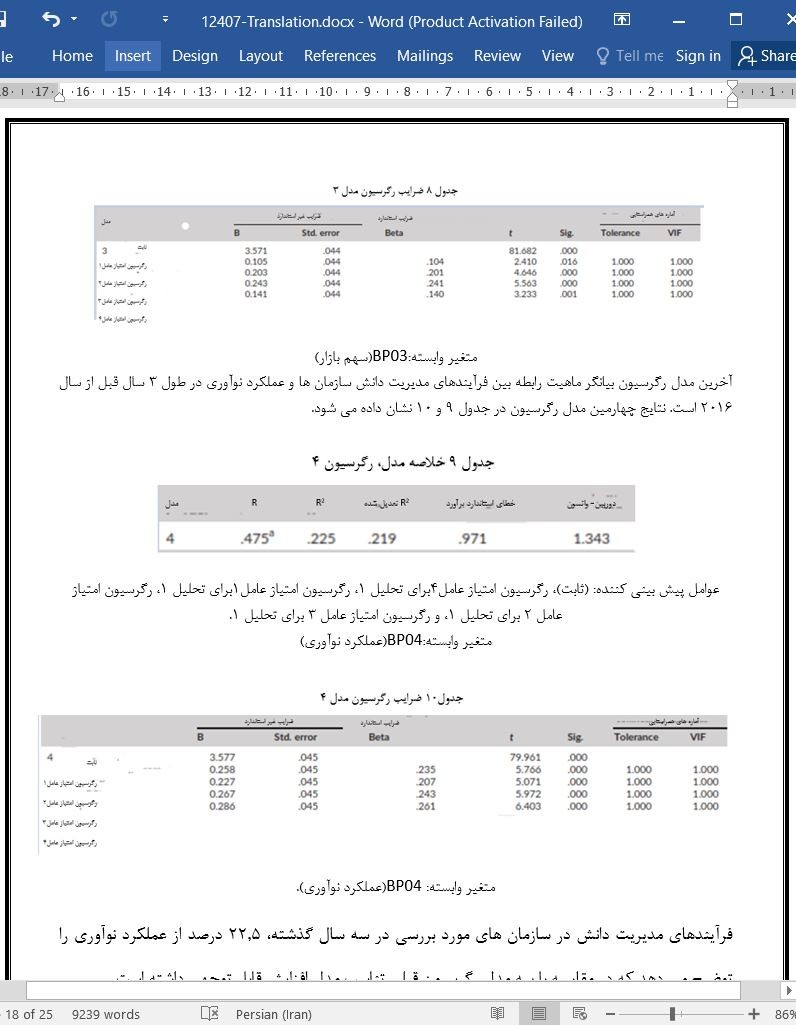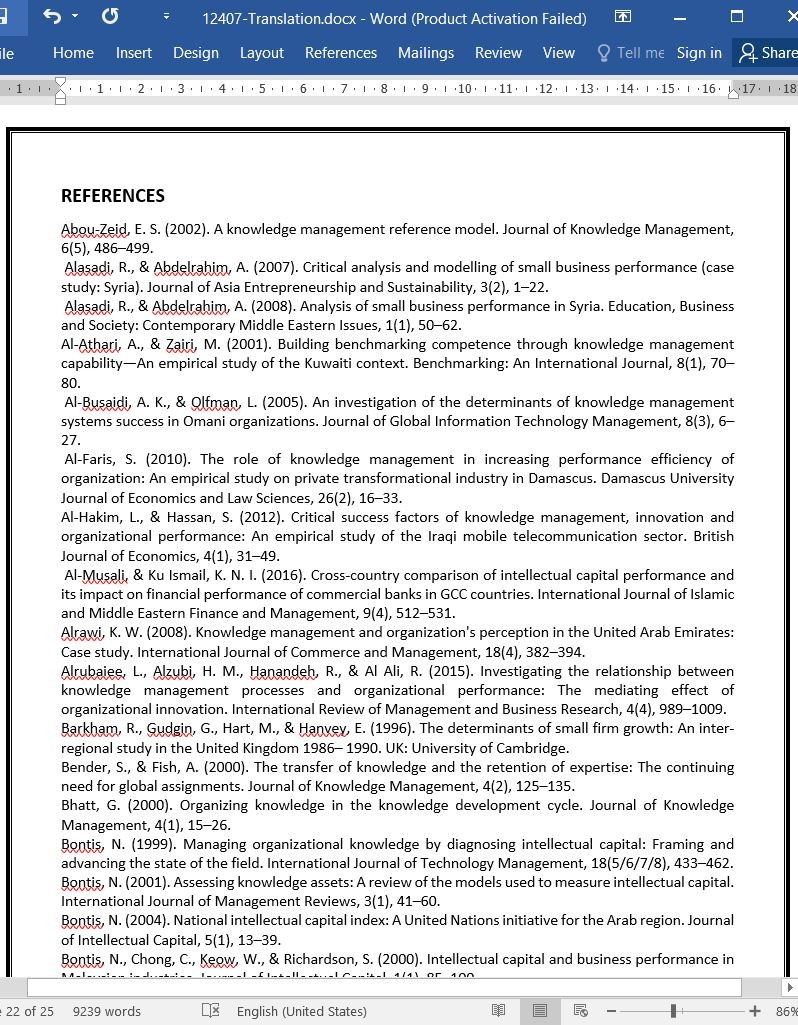
تاثیر فرآیندهای مدیریت دانش بر عملکرد کسب و کار
هدف این تحقیق، بررسی رابطه بین فرآیند های مدیریت دانش(KM) و سطح عملکرد کسب و کار سازمان ها در کشور کویت می باشد. در تحقیق از یک نظرسنجی استفاده شد، که به 500 نفر از کارکنان 139 شرکت دولتی و خصوصی در کویت توزیع شد. آزمون های روایی و پایایی استفاده از ابزار پیمایش را تایید کردند، در حالیکه تحلیل عاملی 4 فاکتور مهم را نشان داد که تاثیر آن عوامل بر عملکرد ارزیابی شد. نتایج تحقیق نشان داد که هر 4 فرآیند مدیریت دانش (به طور مثال، ایجاد و توسعه دانش ، تدوین و ذخیره دانش، انتقال و به اشتراک گذاری دانش، استفاده و ارزیابی دانش) تاثیر مثبت و معناداری بر عملکرد درک شده کسب و کار دارد. علاوه بر این، تحقیق نشان داد که فرآیندهای مدیریت دانش، بیشترین تاثیر را بر عملکرد نوآوری دارند. محدودیت های این پژوهش به طور عمده مربوط به محدوده جغرافیایی محدود تحقیق، است، زیرا، پیمایش فقط شرکت های کویت را بررسی می کند. اصالت این تحقیق، ناشی از پوشش ناحیه جغرافیایی است. درواقع، تاکنون هیچ تحقیق تجربی در زمینه مدیریت دانش، در کویت، به عنوان کشوری وابسته به نفت، انجام نشده است .
1.مقدمه
در اقتصاد دانشی امروزه، رقابت به حدی افزایش یافته است، که مفهوم مزیت رقابتی ناپایدار ممکن است جایگزین مزیت رقابتی پایدار شود که مجموعه ای از مزایای رقابتی محدود به زمان را در بر می گیرد. شرکت های امروزی برای پیشرو بودن، باید به طور مداوم اقدامات استراتژیک جدید ایجاد کنند، و به طور همزمان مزایای رقابتی ناپایداری را ایجاد و از آن بهره برداری کنند. مزایای رقابتی ناپایدار، ماهیت موقتی دارند، اما زمانی که مزایای رقابتی ناپایدار به طور هوشمندانه، تشکیل پورتفولیو را دهد، می تواند در طولانی مدت، شرکت ها را در صدر نگه دارند(مک گراس،2013). شرایط رقابتی جدید شباهت زیادی به مسابقه معروف ملکه سرخ دارد که در این مسابقه دونده ها برای اینکه در جایگاه قبلی خود بمانند، تا جایی که می توانستند باید می دویدند. اما اگر می خواستند جایگاه دیگری به دست بیاورند، باید حداقل دو برابر سریعتر می دویدند(کارول، 1871). یعنی در محیط کسب و کار کنونی، شرکت هایی می توانند به مزیت رقابتی دست یابند که حداقل دوبرابر سریعتر بدوند و همچنین در مقایسه با رقبا، منابع و قابلیت های خود را به صورت کارا تر و اثربخش تر مدیریت کنند. اینها دلایل این است که چرا اقتصاد مبتنی بر دانش امروزی، از مدل کسب و کار کاملا متفاوت پشتیبانی می کند که عمدتا مبتنی بر خلق ثروت از طریق ایجاد، استقرار و بهره برداری از دارایی های مبتنی بر دانش است. از اینرو، محرک اصلی عملکرد شرکت های جدید، شامل دانش، مهارت، دارایی فکری، برند، شهرت و روابط با مشتریان است( زنوپول جاک، جانوسویک و بونتیس، 2016).
6. بحث و نتیجه گیری
این مقاله دو نقش مهم در پژوهش دارد: (1) اولین مطالعه ای است که رابطه بین فرآیندهای مدیریت دانش و عملکرد سازمانی را در کشور کویت تجزیه و تحلیل می کند، و (2) شاخص های جامعی برای مولفه های بیرونی(به طور مثال فرآیندهای مدیریت دانش) و مولفه های درونی(به طور مثال، شاخص های عملکرد سازمانی) ارائه می دهد.
هدف مقاله بررسی تاثیر مدیریت دانش بر عملکرد سازمانی است. در این راستا، هدف مقاله، بررسی تاثیر مستقیم فرآیندهای مدیریت دانش بر عملکرد سازمانی و تحلیل اینکه آیا تفاوت معناداری در کشور کویت وجود دارد یا خیر، می باشد.
The purpose of this research study is to investigate the relationship between knowledge management (KM) processes and the level of business performance of organizations in Kuwait. The research utilized a survey that was administered to 500 employees of 139 private and government companies in Kuwait. Tests of validity and reliability confirmed the use of the survey instrument whereas factor analysis revealed 4 main factors whose impact on performance was assessed. The research results revealed that all 4 KM processes examined (i.e., knowledge generation and development, codification and storage, transfer and sharing, and use and evaluation) have a positive and significant impact on perceived business performance. Additionally, the research revealed that KM processes have the highest impact on innovation performance. The limitation of this study is mainly related to the limited geographical scope of the research, because the survey covered only companies from Kuwait. The originality of the research comes from geographical area covered. Virtually, no empirical research has been undertaken in area of knowledge management in Kuwait, as an oil‐dependent country.
1 - INTRODUCTION
In today's knowledge economy, competition is intensifying to the point where the concept of sustainable competitive advantage may be replaced with transient competitive advantage, which represents a set of time‐bound competitive advantages. For today's companies to stay ahead, they need to start new strategic initiatives on a continuous basis, building and exploiting many transient competitive advantages at once. These advantages are by their nature temporary, but they can keep companies in the lead in the long run when they are intelligently created as a portfolio (McGrath, 2013). The modern competitive situation looks very much like the famous Red Queen's race, where “it takes all the running one can do, to keep in the same place. If they want to get somewhere else, they must run at least twice as fast” (Carroll, 1871). In this sense, competitive advantage in the contemporary business environment is reached by those companies that “run at least twice as fast” and, in doing so, manage their resources and capabilities in a more efficient and more effective way when compared with their competitors. These are the reasons why the contemporary knowledge‐based economy supports a completely different business model that relies mainly on wealth creation through development, deployment, and utilization of companies' knowledge‐based assets. Hence, the main drivers of modern companies' performance include knowledge, competence, intellectual property, brands, reputation, and customer relationships (Dzenopoljac, Janosevic, & Bontis, 2016).
6 - DISCUSSION AND CONCLUSION
This paper has two main contributions to the literature: (a) It is the first study to analyze the relationship between KM processes and organizational performance in a Kuwaiti context, and (b) it provides a comprehensive set of indicators for both the exogenous (i.e., knowledge management processes) and endogenous constructs (i.e., organizational performance indicators).
The purpose of this paper is to examine the effect of knowledge management on organizational performance. In this respect, the paper aims to investigate the direct effects of KM processes on organizational performance and to analyze whether there is a significant difference in Kuwaiti context or not.
1.مقدمه
2. مدیریت دانش در منطقه عرب
3. مروری بر تحقیقات پیشین
3.1. مدیریت دانش:تعاریف و فرآیندها
3.2. رابطه بین مدیریت دانش و عملکرد کسب و کار
4. روش شناسی پژوهش
4.1.توصیف نمونه و حدود پژوهش
4.2. متغیرهای مورد استفاده و فرضیه سازی
5. نتایج
5.1.کفایت اندازه نمونه و پایایی
5.2. تحلیل عاملی
5.3. تجزیه و تحلیل رگرسیون چند گانه
6. بحث و نتیجه گیری
منابع
1 - INTRODUCTION
2 - KNOWLEDGE MANAGEMENT IN THE ARAB REGION
3 - LITERATURE REVIEW
3.1 - Knowledge management: definitions and processes
3.2 - Relationship between knowledge management and business performance
4 - RESEARCH METHODOLOGY
4.1 - Sample description and scope
4.2 - Variables used and hypotheses development
5 - RESULTS
5.1 - Sample size adequacy and reliability
5.2 - Factor analysis
5.3 - Multiple regression analysis
6 - DISCUSSION AND CONCLUSION
REFERENCES
- اصل مقاله انگلیسی با فرمت ورد (word) با قابلیت ویرایش
- ترجمه فارسی مقاله با فرمت ورد (word) با قابلیت ویرایش، بدون آرم سایت ای ترجمه
- ترجمه فارسی مقاله با فرمت pdf، بدون آرم سایت ای ترجمه



